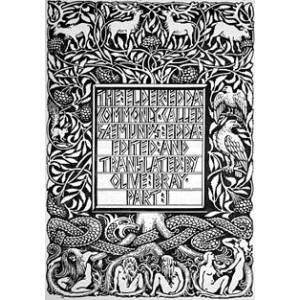
Book: Icelandic Poetry Or The Edda Of Saemund by Loptsson
The Poetic Edda is a collection of Old Norse poems primarily preserved in the Icelandic mediaeval manuscript Codex Regius. Along with Snorri Sturluson's Prose Edda, the Poetic Edda is the most important extant source on Norse Mythology and Germanic heroic legends.Codex Regius was written in the 13th century but nothing is known of its whereabouts until 1643 when it came into the possession of Brynjolfur Sveinsson, then Bishop of Skalholt. At that time versions of the Prose Edda were well known in Iceland but scholars speculated that there once was another Edda—an Elder Edda—which contained the pagan poems which Snorri quotes in his Prose Edda. When Codex Regius was discovered, it seemed that this speculation had proven correct. Brynjolfur attributed the manuscript to Semundr the Learned, a larger-than-life 12th century Icelandic priest. While this attribution is rejected by modern scholars, the name Semundar Edda is still sometimes encountered.
Bishop Brynjolfur sent Codex Regius as a present to the Danish king, hence the name. For centuries it was stored in the Royal Library in Copenhagen but in 1971 it was returned to Iceland.
Books in PDF format to read:
Saint Synaptics - Metaclysmia Discordia Or The ChaonomiconWim Van Den Dungen - Enoch And The Day Of The End
Stephen Flowers - Fire And Ice Magical Order The Brotherhood Of Saturn
Loptsson - Icelandic Poetry Or The Edda Of Saemund


